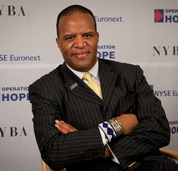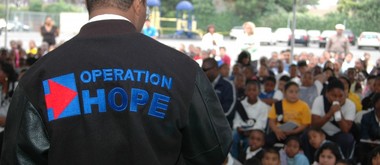
Regional: Focus: World
Category: Poverty Eradication, Financial Literacy
John Hope Bryant is an American financial dignity and poverty eradication activist, "silver rights" leader, author and social entrepreneur. Bryant is the founder, chairman and CEO of Operation HOPE (HOPE) and President and CEO of Bryant Group Companies.
In May 1992 Bryant founded HOPE following one of the worst riots in U.S. history, the Los Angeles riot. Operation HOPE is a nonprofit private banker for the working poor, the underserved and struggling middle class. HOPE has served more than (two) million people, has a volunteer base of more than 20,000 people and serves more than 300 U.S. cities, as well as South Africa, Saudi Arabia, Morocco and the United Arab Emirates.
In 2004 Bryant was named a Young Global Leader (YGL) by the World Economic Forum where he co-created Global Dignity with fellow YGL members’ professor Pekka Himanen of Finland and HRH Crown Prince Haakon of Norway. As an YGL alumnus, Bryant serves on the Forum’s Global Agenda Council and proudly continues toward their goal to model a better world by 2030. In 2008 Bryant was appointed vice chairman of the President’s Advisory Council on Financial Literacy (PACFC) by President George W. Bush and continued this appointment work under President Barack Obama until the committee dissolved in 2013.
Former U.S. President Bill Clinton described Mr. Bryant in his bestselling book GIVING as a, “whirlwind of ideas and action. Lean, intense, focused, and completely positive in his belief in the potential of poor people to prosper, with ‘a hand up and not a hand out.’”
I was born and raised in South Central Los Angeles, California. My parents were very entrepreneurial and that was passed along to me. Believe it or not I got my start as an entrepreneur when I was 10 years old selling candy to neighbors and children in my neighborhood in Compton, California.
You’re tackling one of the world’s most pressing topics: Poverty. Where did your original business idea come from and what motivated you to take on such a challenging task?
Immediately following one of the worst urban riots and civil unrest in U.S. history, the Rodney King Riots, April 29, 1992, I was inspired by my pastor and spiritual father the Reverend Dr. Cecil “Chip” Murray to develop resources that will change underserved communities. One way to better opportunities is money management and I founded Operation HOPE as America’s first nonprofit social investment banking organization.
Can you tell us more about Operation HOPE? What exactly is Project 5117?
Operation HOPE is the continuance of Dr. Martin Luther King, Jr. third phase in his work with the civil rights movement, the Poor People’s Campaign. We are changing Civil Rights to Silver Rights empowerment through programs, initiatives and resources that teach children and adults financial dignity and literacy.
Project 5117 is an initiative that will empower those who earn less than $50,000 a year. It is a mission that is supported by a broad range of services that include:
- 5 million youth empowered with a new level of financial literacy with unique financial dignity education programs.
- 1 million of these empowered youth will have an opportunity to become future entrepreneurs and local job creators through HOPE Business In A Box Academies, supported by a 100-year partnership with the Gallup Organization.
- 1,000 first-ever bottom-up empowerment centers, branch banks with HOPE Inside units spread through out America and 5,000 certified locations (non-banks) containing “HOPE Inside +” units.
- 700 Credit Score Communities will be attained through the expansion of HOPE Inside and “HOPE Inside +” locations.
You are one of the most influential entrepreneurial leaders in the country, advising presidents and advocating entrepreneurship. What is your secret to success?
It’s simple really, perseverance. Through perseverance you can achieve anything and part of this perseverance is working hard, having personal belief in your goals, dreams and missions, and faith in God.
You promote the concept of financial dignity. What do you mean by this and how can we achieve it?
Financial dignity uses the tools from financial literacy to help the youth and adults achieve goals and bring to life their dreams and aspirations. It is the combination of a person’s strength with the education about finances and money management leading to greater opportunities.
Do you believe that 100% financial literacy will eradicate poverty?
No, but I believe a lack of financial literacy will ensure poverty forever.

Eighty percent of the youth labor market crisis can be solved via entrepreneurship. In the United States 70% of all businesses have 500 or less employees. There are no skyscrapers or international companies in inner cities, but you will find several two-story buildings that need to be filled with suitable and profitable businesses. Through our HOPE Business in a Box Academies (HBIAB) we educate students on developing a business and offer grants to get them started.
Seeing that you serve as a role model for many novice entrepreneurs, who was your own ‘role model’ when developing your own entrepreneurial passion?
There were several people who I looked up to and were able to seek advice and assistance from in growing Operation HOPE. My mother and father were my first role models and Reginald Lewis, a very successful African–American businessman and venture capitalist who bought the McCall Pattern Company and I thought, ‘If he can do it I can do it too.’ The list of role models include Dr. Martin Luther King Jr., Ambassador Andrew Young, Nelson Mandela and Quincy Jones, just to name a few.
Do you have any particular advice for young and novice entrepreneurs who want to make a difference in the world?
Go do something. It doesn’t matter what you do but go do something for somebody other than yourself.
What were the greatest challenges you had to face in your entrepreneurial career?
Exhaustion, not enough time, exasperation, disappointment, fear is a prosperity killer, feeling overwhelmed and finding moments not consistent with overall approach. One must remember these moments are temporary and will pass while perseverance is your mate.
Tell us what is the most amazing moment you experienced with Operation HOPE?
Talking right now to one of our HOPE Fellows. This is an idea I had two years ago and now we have more than 20 Fellows. The interns and fellows are young heroes and every time I talk one of them I feel encouraged.
Setting up a nonprofit venture that is financially sustainable is an extremely challenging task for every novice social entrepreneur. How did you achieve this goal in the beginning of your entrepreneurial journey? What financial advice would you give to upcoming social entrepreneurs?
Perseverance, persistence and redefine the meaning of success. Failure is a success because it keeps you moving and growing.
Never give up and live under your means. Don’t confuse business with the business you want. Underestimate and over perform. Try not to pay yourself a salary early on because the first three will be nothing but pain, but after three years there is a good chance your business will survive. Cash is king and you never want to run out of cash.
If you were to start another business today, what would you do? In other words: Where do you see, from a societal perspective, the biggest need and potential?
I see needs with charter schools, real estate and investment funds for inner cities, but honestly I am living my dream so I would be doing what I am doing now.
What is your opinion about the role of “Luck” (being in the right place at the right time, meeting the right people etc.) in an entrepreneurs’ career?
Luck is manufactured. If you work hard, get out there and envision yourself doing what you dream of doing you can accomplish anything. We are filled with mercy and grace. Mercy is when someone does not get what they deserve and grace is when someone is given something they don’t deserve. If you want grace you must have mercy. The universe is the perfect accounting system.
See an interview with John Hope Bryant on Financial Literacy at the 2013 Global Economic Symposium in Kiel (Germany):

 RSS Feed
RSS Feed
